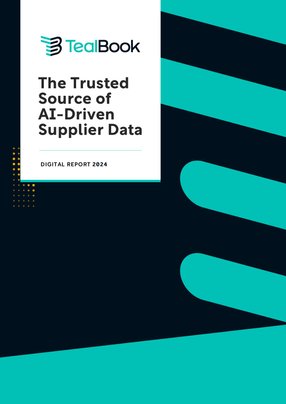TealBook: The Trusted Source of AI-Driven Supplier Data
Cast your minds back a decade or two. You reach to your binder, file-o-fax or folder to share the details of one of your suppliers with a partner. This practice, while not particularly efficient or well organised, was the backbone of many businesses. It held the details of trusted suppliers, essential partners, specific vendors and much more.
Stephany Lapierre, Founder and CEO at TealBook, knew there had to be a better way. She saw an opportunity to boost efficiency in procurement while she was sat waiting for a partner to find a specific, teal-coloured card from her binder.
Meet TealBook, the most trusted source for supplier data
In short, TealBook is a trusted source of supplier data.
“We built an architecture that turns the dream of achieving data quality at scale into a tangible reality,” Stephany explains. “We want to enable any procurement organisation to be able to achieve data quality at scale, no matter where they need data – across their entire source-to-pay ecosystem.”
The investment that goes into suppliers is more than the money exchanged for goods and services, but also the management, people, technology, services, onboarding, sourcing, category management, invoicing, contract and more.
TealBook is all about optimising the investment that companies put into those relationships and understanding that, sometimes, companies with a lower spend have incredibly high value for other reasons, something Stephany believes has been previously overlooked.
She asked herself: “How do you democratise information within an enterprise so that people can leverage it, create a brain for the company?”
What started as a transparent, dynamic book of suppliers exploded into an actionable, interactive data foundation.
The evolution of TealBook
Stephany originally founded Matchbook, a service designed to find the right suppliers for companies, streamlining procurement processes. Within its first year, the company became profitable and started to become a tool that went hand in hand with sourcing.
Her proactive, responsive, passionate approach led to the creation of TealBook. Clients’ needs developed to require support in building procurement functions to be more strategic, transparent, faster and prioritise cost optimisation over savings – so she provided that.
“As I provided these solutions, it started dawning on me that the problem with procurement was not software people or processes – actually, we overprocessed everything. It was a data problem,” Stephany explains.
“If we had good data and we could feed good data across these systems, it would drive better compliance and value of those systems and we could get built-in intelligence that would allow us to better optimise the investment made in suppliers.
“Can you imagine revenue teams operating without data? Of course not, that would be unthinkable – but procurement was.”
Stephany saw the clear issues in running companies without data-driven procurement and turned her focus from Matchbook to TealBook.
She continues: “I thought if I don't do it, I will regret not doing it or worse, nobody's going to think about the problem this way and then it will be a decade or two later and it will still be high software dependency with siloed and disparate data. And I just didn't think that was acceptable.”
Stephany and her team at TealBook pioneered a machine learning-driven approach to data curation, ensuring businesses have access to accurate and up-to-date information.
“The thesis is that suppliers are more likely to update their websites before they update a bunch of supplier portals,” Stephany explains. “If we could capture the name, address, goods and services, team structure, any sort of logo of certificates or customers and any sub-site that would link us to other companies, then we could probably get a pretty good picture of what that company does.”
This led to the creation of universal supplier profiles, upon which TealBook expanded the data foundation.
“That was pretty novel at the time,” Stephany adds. “We could automate the collection, verification, and the enrichment of supplier data, create our own profiles and we didn't need to depend on D&B or other sources.”
And so, TealBook became an AI-first company that used automation to collect, verify, and enrich supplier data. Since then, the company has expanded its data foundation to pull more data at scale, fully automate that data and bring transparency and visibility into the quality of the data it is able to send back to customers.
Quality data: A foundational essential
“It all starts with quality data,” Stephany says.
Many procurement organisations face challenges in securing high-quality data due to its vast quantity and dispersion across various systems within the organisation. The absence of centralisation leads to the creation of data silos, undermining the quality of the foundations of systems, processes and decision-making due to the lack of reliable data.
“Quality supplier data is needed across systems and processes,” Stephany emphasises.
Quality supplier data enables decision-making and gives visibility to the procurement team so it can fully optimise the investment made in suppliers and help the organisation achieve its goals. That could be improving margins, achieving ESG targets, mitigating risks, bringing innovation within the organisation or improving how capital is being spent across the entire supplier portfolio.
“Meanwhile, most procurement organisations are operating with no quality data and are making decisions based on instincts or focusing on analytics, not having the right data to deliver trusted insights,” Stephany continues.
This is the foundation of TealBook’s mission – being the trusted source of supplier data to the market.
The CEO goes on: “Quality data is foundational – it's the biggest opportunity that procurement has to enable multiple teams across the organisation to access the information they need about their suppliers.”
Building a trusted data foundation
TealBook is built on innovation, so, naturally, it is continually developing and improving.
Over the past two years, Stephany and the TealBook team have dedicated their efforts to developing a new platform specifically designed to meet four critical customer requirements.
1. Transparency: The revamped platform offers superior quality and greater transparency in data, empowering customers to make informed decisions based on a trusted source.
2. Quantity: TealBook finds that its customers want more data that meets more requirements across the entire life cycle. “We've built an architecture that allows us to continuously add new data sources, update those data sources automatically so that we can deliver more data across more suppliers, more attributes, and also improve the quality of those attributes that we're delivering to customers,” says Stephany, with enthusiasm.
3. Speed: Clients have requested faster vendor data enrichment to allow them to speed up their activities including achieving goals, responding to questions from their stakeholders or the leadership team, accelerating category management, and having more updated information into their sourcing systems. “In response, we’ve created a way that customers can self-serve how they're able to load, process, normalise, match and enrich their vendor master in minutes,” Stephany says. “And they can do this whenever they need it.” This removes the need to depend on manual processes or third-party providers and wait to get cleansed and enriched vendor data.
4. Control. “Procurement teams want more control, visibility and to be able to syndicate the data they choose and trust across their entire source-to-pay ecosystem,” says Stephany. “So we've built a really easy way for customers to consume the data via API or they can even export and flat file when they need it.”
The ethos behind TealBook is clear – quality data first. And, as procurement technologies continue to evolve, TealBook’s focus on quality data remains the same.
Reimagining procurement with Gen AI
The future of TealBook is AI-driven and centres on its recent collaboration with Google, aimed at bringing the power of Gemini to procurement.
The collaboration focuses on using TealBook as the data foundation and combining it with Gemini, Google’s Gen AI technology, to help procurement teams find insights into suppliers and source new ones.
“In combining the two elements, we give customers access to contextual and high-quality relevant information about suppliers that they can quickly digest and use for conversations for decision making,” Stephany explains.
The new application has also allowed TealBook clients to identify similar suppliers based on their requirements and to do more with the information, including collaborating with stakeholders to achieve a much faster, better business outcome.
“We're positioning this Gen AI app as the ‘intern for sourcing’ because it will help sourcing managers get the information they need with more trusted data to deliver the best possible insight – and then accelerate the time to value to be able to help the business move faster,” Stephany says.
“We're looking at this Gen AI app as an opportunity to improve it, to make it even more valuable over time and really help sourcing managers focus on more strategic things and then leverage their ‘intern’ to make those decisions.”
The team has prioritised flexibility in the app, allowing it to be used within TealBook’s app, but also as an embedded function in Microsoft Teams, Slack or any other regular workflow that TealBook clients may already be using.
Stephany concludes: “Using data quality from TealBook combined with the infrastructure and the technology of Google allows us to build a best-in-class Gen AI app that will deliver real, meaningful business outcomes for procurement organisations.”
**************
Make sure you check out the latest edition of FinTech Magazine and also sign up to our global conference series - FinTech LIVE 2024
**************
FinTech Magazine is a BizClik brand



